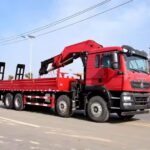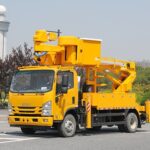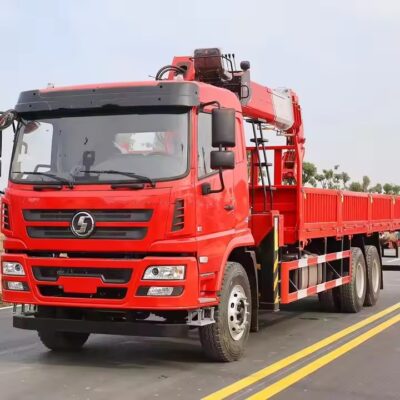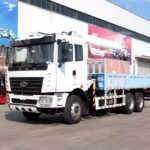The primary function of the トラック搭載クレーン is lifting and transportation. The lifting operation mainly relies on the crane, and the extension and bending of the crane are primarily achieved through the cylinders. それで, what are the classifications of the cylinders of the トラック搭載クレーン and what are the characteristics of these cylinders?

初め, the comparison between single-cylinder and double-cylinder of the truck-mounted crane:
The single-cylinder structure involves one cylinder pulling the steel wire rope and driving the three telescopic arms to extend and retract simultaneously. The double-cylinder structure entails the first-stage cylinder driving the first telescopic arm to extend and retract, and then the second-stage cylinder pulling the steel wire rope and driving the second and third telescopic arms to extend and retract simultaneously. The abovementioned are all no-load telescopic operations. 今, let’s discuss telescopic operations with load: During the telescopic operation with load of the single cylinder, the single cylinder provides all the power required for the boom to extend and retract. Consequently, after the boom extends, the telescopic capacity with load decays rapidly. During the boom telescopic operation of the double cylinder, the first-stage cylinder drives the second telescopic arm and can offer a large thrust during the telescopic operation with load, enabling the boom to obtain a strong telescopic capacity with load. When the second-stage cylinder extends, it simultaneously drives the third and fourth sections of the boom to extend through the steel wire rope and provides a small thrust during the telescopic operation with load. したがって, during the telescopic operation with load of the boom, the telescopic capacity with load decays at a slower pace.

の トラック搭載クレーン also features luffing cylinders, and the luffing cylinders are further divided into single-cylinder and double-cylinder.
Double-cylinder: The double-cylinder design can reduce the overall height of the machine to a certain extent. The stability of the double cylinder is commendable. When the seal inside the cylinder is damaged and internal leakage occurs, the boom remains in alignment with the top pin shaft of the cylinder and will not cause damage to any component.
Single-cylinder: The single-cylinder is convenient for maintenance and operates stably. The force-bearing area of the double cylinder is larger than that of the single cylinder.
The similarities between the two: The lifting capacity of the cylinder is solely related to the acting area and pressure of the cylinder. The lifting capacity of the single and double cylinders with the same acting area and pressure is identical.
After listening to the introduction from professionals, we come to realize that there is such an abundance of knowledge regarding the cylinders of the トラック搭載クレーン. When purchasing a トラック搭載クレーン, everyone can take these as references and select the one that suits their needs.

今, let’s delve deeper into some additional aspects and considerations regarding the characteristics of truck-mounted crane cylinders:
The material and manufacturing quality of the cylinders play a crucial role in their performance and durability. High-quality materials and precise manufacturing processes ensure that the cylinders can withstand the high stresses and frequent use associated with crane operations. Cylinders made from robust alloys and subjected to rigorous quality control are more likely to have a longer service life and better reliability.
The sealing mechanisms of the cylinders are also of significant importance. Effective seals prevent hydraulic fluid leakage, which not only maintains the efficiency of the system but also reduces the risk of contamination and damage to the surrounding components. Advanced sealing technologies and regular inspections of the seals can contribute to the smooth operation and longevity of the cylinders.
The speed and smoothness of the cylinder’s extension and retraction can impact the overall efficiency and precision of the crane’s lifting operations. Faster and more consistent movement allows for quicker and more accurate positioning of the load, enhancing productivity and safety.
The compatibility of the cylinders with the crane’s hydraulic system is another key factor. A well-matched hydraulic system ensures optimal pressure and flow delivery to the cylinders, maximizing their performance and minimizing the potential for system failures or inefficiencies.

Environmental conditions can also affect the performance of the cylinders. Extreme temperatures, humidity, and exposure to contaminants or corrosive substances can potentially degrade the cylinder’s components and functionality over time. Special coatings or protective measures might be necessary in harsh operating environments.
When considering the choice between single-cylinder and double-cylinder designs for luffing or telescoping, factors such as the specific lifting requirements, 使用頻度, and the available space on the crane should be taken into account. 場合によっては, a single-cylinder design might offer simplicity and cost-effectiveness for less demanding applications, while a double-cylinder design might be preferred for heavy-duty and high-precision lifting tasks.
さらに, the maintenance and repair capabilities for the chosen cylinder configuration should also be evaluated. Easier access for maintenance and the availability of replacement parts can significantly reduce downtime and maintenance costs over the lifespan of the トラック搭載クレーン.
結論は, understanding the characteristics of トラック搭載クレーン cylinders involves considering a multitude of factors beyond the basic distinctions between single and double-cylinder designs. A comprehensive assessment of these factors can help buyers make informed decisions and ensure the efficient and reliable operation of the crane in various working conditions.









